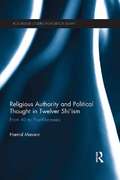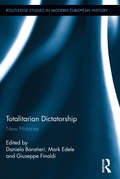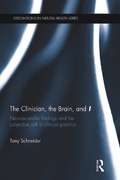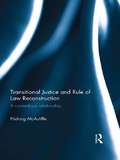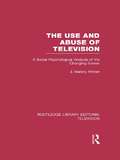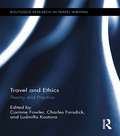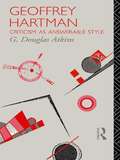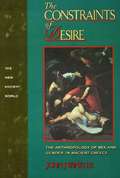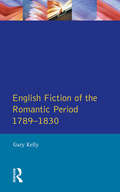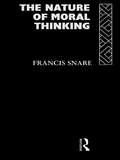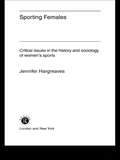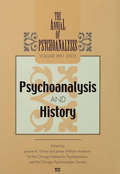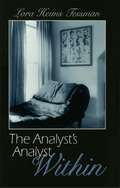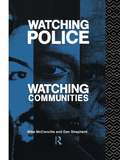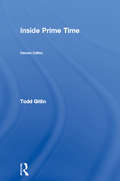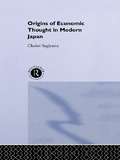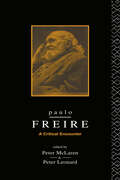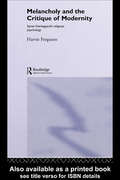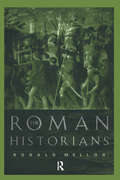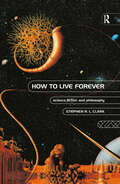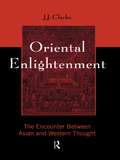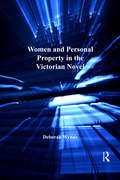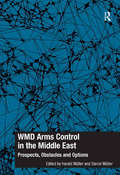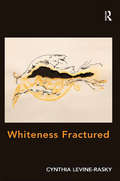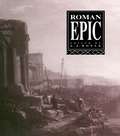Special Collections
Benetech’s Global Certified Accessible Titles
Description: Benetech’s GCA program is the first independent third-party EPUB certification to verify ebook accessibility. By creating content that is born accessible, publishers can meet the needs of all readers. Learn more: https://bornaccessible.benetech.org/
- Table View
- List View
Religious Authority and Political Thought in Twelver Shi'ism
by Hamid MavaniRanging from the time of the infallible Imams, to the contemporary era, this book provides a comprehensive overview of Shi’i religious and political authority, focusing on Iran and Lebanon, without limiting the discourse to Khomeini’s version of an Islamic State. Utilising untapped Arabic and Persian sources, Hamid Mavani provides a detailed, nuanced, and diverse theoretical discussion on the doctrine of leadership (Imamate) in Shi’ism from traditional, theological, philosophical, and mystical perspectives. This theoretical discussion becomes the foundation for an analysis of the transmission of the Twelfth Imam’s religious and political authority vis-á-vis the jurists during his Greater Occultation. Bringing the often overlooked diversity within the Shi’i tradition into sharp focus, Religious Authority and Political Thought in Twelver Shi’ism discusses what constitutes an Islamic state, if there is such a notion as an Islamic state. Hamid Mavani further explores the possibility of creating a space for secularity, facilitating a separation between religion and state, and ensuring equal rights for all. This book argues that such a development is only possible if there is a rehabilitation of ijtihad. If this were to materialise modern religious, social, economic, political, and cultural challenges could be addressed more successfully. This book will be of use to scholars and students with interests ranging from Politics, to Religion, to Middle East Studies.
Totalitarian Dictatorship
by Mark Edele and Giuseppe Finaldi and Daniela BaratieriThis volume takes a comparative approach, locating totalitarianism in the vastly complex web of fragmented pasts, diverse presents and differently envisaged futures to enhance our understanding of this fraught era in European history. It shows that no matter how often totalitarian societies spoke of and imagined their subjects as so many slates to be wiped clean and re-written on, older identities, familial loyalties and the enormous resilience of the individual (or groups of individuals) meant that the almost impossible demands of their regimes needed to be constantly transformed, limited and recast.
The Clinician, the Brain, and 'I'
by Tony SchneiderThe clinician needs to make sense of many client experiences in the course of daily practice: do these experiences reflect the simple product of complex neurochemical activity, or do they represent another dynamic involving the subjective self? When research findings from the neurosciences are applied to clinical psychology, reductionist thinking is typically followed, but this creates problems for the clinical practitioner. In this book Tony Schneider draws together the three strands of philosophy, neuroscience, and psychology to explore the mind/body question as it affects the clinician. Taking a position more closely aligned with dualism, he argues for the utility in making distinctions between brain activity and ‘I’ – the subjective self – both in general psychological functioning and in psychopathology. Schneider considers traditional psychological topics contextualized by neuroscience research and the mind/body issue, as well as applying the ideas to various areas of clinical practice. Topics include: -the mind and body from the clinician’s perspective -fundamental aspects of the role and mechanics of the brain -the developing self and the relationship of ‘I’ with the self and with others -psychological functioning such as focus and memory, sleep and dreaming, and emotions and pain. The idea that ‘I am not my brain’ will resonate with many clinicians, and is systematically argued for in clinical literature and neuropsychology research here for the first time. The book will be of particular interest to psychologists, psychiatrists, counsellors and clinicians who wish to incorporate advances in neuroscience research in the conceptualization of their clinical work, and are looking for a working model that allows them to do so.
Transitional Justice and Rule of Law Reconstruction
by Padraig McAuliffeThis short and accessible book is the first to focus exclusively on the inter-relation between transitional justice and rule of law reconstruction in post-conflict and post-authoritarian states. In so doing it provides a provocative reassessment of the various tangled relationships between the two fields, exploring the blind-spots, contradictions and opportunities for mutually-beneficial synergies in practice and scholarship between them. Though it is commonly assumed that transitional justice for past human rights abuses is inherently conducive to restoring the rule of law, differences in how both fields conceptualise the rule of law, the scope of transition and obligations to citizens have resulted in divergent approaches to transitional criminal trial, international criminal law, restorative justice and traditional justice mechanisms. Adopting a critical comparative approach that assesses the experiences of post-authoritarian and post-conflict polities in Latin America, Asia, Europe and Africa undergoing transitional justice and justice sector reform simultaneously, it argues that the potential benefits of transitional justice are exaggerated and urges policy-makers to rebalance the compromises inherent in transitional justice mechanisms against the foundational demands of rule of law reconstruction. This book will be of interest to scholars in the fields of transitional justice, rule of law, legal pluralism and peace-building concerned by the failure of transitional justice to leave a positive legacy to the justice system of the states where it operates. ‘This is a bold and nuanced scrutiny of the international system’s approach to transitional justice and the much vaunted rule of law project. Dr McAulifee should be congratulated for this well-researched book which should be a must read for not only scholars and researchers in transitional justice and peace and conflict studies, but also policy-makers in the international system.’ Dr. Hakeem O. Yusuf, Senior Lecturer, University of Strathclyde and author of Transitional Justice, Judicial Accountability and the Rule of Law.
The Use and Abuse of Television
by J. Mallory WoberA critical review of the harms and benefits of television that also examines systems for maximizing television's benefits. The author breaks away from the conventional jargon of audience measurement and other traditional research methods, proposing instead new and alternative European and Australian methods of evaluating programming. Typical characterizations of the television screen – broadly defined to include television, home video, movies, games, programs and computers – as either the root of all social ills or the potential savior of society are reexamined. Wober's ultimately optimistic viewpoint seeks to trigger change in the way we think about and assess television and in turn ensure that screens will serve, rather than take advantage of, their users. Originally published in 1988, this thinking-piece concerns timeless issues still of import.
Travel and Ethics
by Charles Forsdick and Corinne Fowler and Ludmilla KostovaDespite the recent increase in scholarly activity regarding travel writing and the accompanying proliferation of publications relating to the form, its ethical dimensions have yet to be theorized with sufficient rigour. Drawing from the disciplines of anthropology, linguistics, literary studies and modern languages, the contributors in this volume apply themselves to a number of key theoretical questions pertaining to travel writing and ethics, ranging from travel-as-commoditization to encounters with minority languages under threat. Taken collectively, the essays assess key critical legacies from parallel disciplines to the debate so far, such as anthropological theory and postcolonial criticism. Also considered, and of equal significance, are the ethical implications of the form’s parallel genres of writing, such as ethnography and journalism. As some of the contributors argue, innovations in these genres have important implications for the act of theorizing travel writing itself and the mode and spirit in which it continues to be conducted. In the light of such innovations, how might ethical theory maintain its critical edge?
Geoffrey Hartman
by G. Douglas Atkins`The critic explicitly acknowledges his dependence on prior words that make his word a kind of answer. He calls to other texts "that they might answer him."' Geoffrey Hartman is the first book devoted to an exploration of the `intellectual poetry' of the critic who, whether or not he `represents the future of the profession', is a unique and major voice in twentieth-century criticism. Professor Atkins explains clearly Hartman's key ideas and places his work in the contexts of Romanticism and Judaism on which he has written extensively. In Geoffrey Hartman he provides a valuable introduction to a major critical voice who has called into question our assumptions about the distinction between commentary and imaginative literature.
The Constraints of Desire
by John J. WinklerFor centuries, classical scholars have intensely debated the "position of women" in classical Athens. Did women have a vast but informal power, or were they little better than slaves? Using methods developed from feminist anthropology, Winkler steps back from this narrowly framed question and puts it in the larger context of how sex and gender in ancient Greece were culturally constructed. His innovative approach uncovers the very real possibilities for female autonomy that existed in Greek society.
English Fiction of the Romantic Period 1789-1830
by Gary KellyEnglish Fiction of the Romantic Period 1789-1830 is the first comprehensive historical survey of fiction from that period for many decades. It combines a clear awareness of the period's social history with recent developments in literary criticism, theory and history, and explains the astounding variety of forms in Romantic fiction in terms of the various cultural, political, social, regional and gender conflicts of the time. It provides a broad-ranging survey from the major authors and works through to the sub-genres of the period. Jan Austin and Sir Alter Scott are discussed alongside the Gothic Romance, political and feminist fiction, social satire and regional, rural and historical novels. It also provides a comparison of the methods of distribution and marketing and the availability of books then and now; examines cheap popular fiction and children's fiction, and considers the recent debate about the place of prose fiction in a Romantic literature hitherto dominated by poetry.
The Nature of Moral Thinking
by Francis SnareThe Nature of Moral Thinking is an introductory text to the questions of ethics, offering a solid philosophical and historical basis for understanding the central issues. Francis Snare discusses in detail the classical philosophical arguments of Plato and Butler in relation to relativism and subjectivism and treats Marx and Nietzsche in regard to the origins and explanation of morality.
Sporting Females
by Jennifer Hargreaves1994 North American Society for the Sociology of Sport Annual Book AwardAn outstanding contribution to feminist analysis of sport from the nineteenth century to the present day. Jennifer Hargreaves views sport as a battle for control of the physical body and an important area for feminist intervention. Placing women at the centre of discussion, no other book is as comprehensive.
The Annual of Psychoanalysis, V. 31
by Jerome A. Winer and James William AndersonIn 1958 William L. Langer, in a well-known presidential address to the American Historical Association, declared the informed use of psychoanalytic depth psychology as "the next assignment" for professional historians. Psychoanalysis and History, volume 31 of The Annual of Psychoanalysis, examines the degree to which Langer's directive has been realized in the intervening 45 years. Section I makes the case for psychobiography in the lives of historical figures and exemplifies this perspective with analytically informed studies of the art of Wassily Kandinsky; the films of Stanley Kubrick; and the anti-Semitism of Adolf Hitler. Section II reviews Freud's own psychohistorical contributions and then considers the relevance to historical inquiry of the more recent perspectives of Winnicott, Kernberg, and Kohut. Section III explores an intriguing tributary of psychobiographical inquiry: the impact of the biographer's own subjectivity on his or her work. Section IV turns to a topic of perennial interest: the psychobiographical study of American presidents. Section V turns to the special challenges of applying psychoanalysis to topics of religious history and includes topical studies of religious figures as disparate as the 15th century Asian Drukpa Kunley and Osama bin Laden. Section VI focuses on the recent extension of psychohistorical inquiry to groups of people and to cultural phenomena more generally: an investigation of the youth movement in pre-Nazi Germany; consideration of how societies, no less than individuals, reenact and work through traumas over time; and an outline of the role of analysis in constructing a depth-psychological "social psychology" of use to historians. These papers, no less than those that precede them, are compelling testimony to the claim with which editors James William Anderson and Jerome A. Winer begin the volume, to wit, that "Psychoanalysis would seem to be a resource indispensable to the study of history."
The Analyst's Analyst Within
by Lora H. TessmanThe Analyst's Analyst Within is the most illuminating study to date of how psychoanalysts' experiences with their own analysts affect their lives, their loves, and their evolving professional identities. A gifted interviewer with equally gifted interview subjects, Tessman samples different gender combinations and age ranges in showing how the values typifying different eras of psychoanalytic theorizing enter into the meaning and impact of training analyses. Tessman's findings are striking, and they do not end with her discovery of startling differences according to the decade during which a training analysis took place. She also found that neither the theoretical orientation of the training analyst nor his or her technical preferences predicted whether, years later, the analysis would be remembered as satisfying or dissatisfying, as growth promoting or thwarting. Rather, it was the quality of affective engagement that became reliably present, with the figure of the training analyst, inscribed in all his or her particularity, accounting for the perceived sense of a truly productive analytic experience. Tessman's research program, which encompasses her methodology, her skill as an interviewer, and the wisdom and clarity of thought of her participants, lifts this work well beyond the perfunctory debates about psychoanalytic training that recur in the journal literature. The power of The Analyst's Analyst Within resides in compelling individual narratives in which analysts revisit their own treatment past - and the analyst within - with candor, vividness, and often great poignancy. The result is a book that not only supersedes previous studies of the training analysis but also opens a new vista on how and why analysis works when it works and fails when it fails.
Watching Police, Watching Communities
by Mike McConville and Dan ShepherdFrom the early 80s community policing has been held up as a new commitment to the ideals of service and the rejection of coercive policing styles. The idea was to encourage a partnership between the public and police in which community needs would be met by officers on local beats. Today, Government ministers and senior police officers depict Neighbourhood Watch, the centrepiece of the scheme, as a great success. However, Watching Police, Watching Communities reveals that most schemes are dormant or dead. The authors trace the causes of scheme failure to the lack of commitment to community policing by police forces. Most importantly, they find a police rank-and-file culture which celebrates aggression, machismo and the assertion of authority especially against areas occupied by ethnic minorities and other disadvantaged groups.
Inside Prime Time
by Todd GitlinPrime time: those precious few hours every night when the three major television networks garner millions of dollars while tens of millions of Americans tune in. Inside Prime Time is a classic study of the workings of the Hollywood television industry, newly available with an updated introduction. Inside Prime Time takes us behind the scenes to reveal how prime-time shows get on the air, stay on the air, and are shaped by the political and cultural climate of their times. It provides an ethnography of the world of American commercial television, an analysis of that world's unwritten rules, and the most extensive study of the industry ever made.
The Origins of Economic Thought in Modern Japan
by Chuhei SugiyamaBy throwing light on economic thought in the period of the Japanese Enlightenment, this book will make clear what led to the institutionalization of business and economic education, the birth of the pioneer business enterprise and of serious economic journalism and the reasons behind the success of Japanese economic development.
Paulo Freire
by Peter Leonard and Peter McLarenPaulo Freire is one of the century's great thinkers on education and the politics of liberation. Known mostly for his literacy campaigns in Latin America and Africa, and for his seminal work Pedagogy of the Oppressed, his thinking continues to be rediscovered by generations of teachers, scholars, community activists and cultural workers in Europe and North America. While his name is synonymous with the practice of Critical Literacy' and A Pedagogy of Liberation', his work has been appropiated in many diverse fields of discipline and site-based projects of social reform. This volume represents a pathfinding analysis of Freires work and in many cases it offers an extension of his thinking in order to make it more applicable to first world contexts. Peter McLaren and Peter Leonard have brought together a divergent group of scholars widely recognized for their contributions to critical theory and critical pedagogy. Themes addressed include Freier's relation to feminist critique, his philosophical roots and an evaluation of his ideas from postmodernist and postcolonialist perspectives. The collection will be essential reading for anyone interested in the radical sociology of education and the politics of liberation.
Melancholy and the Critique of Modernity
by Harvie FergusonThe connections between the emergence of modern society and the experience of melancholy are explored through a comprehensive re-examination of Soren Kierkegaard's rich and insightful writings.
The Roman Historians
by Ronald MellorThe Romans' devotion to their past pervades almost every aspect of their culture. But the clearest image of how the Romans wished to interpret their past is found in their historical writings. This book examines in detail the major Roman historians:* Sallust* Livy* Tacitus* Ammianusas well as the biographies written by:* Nepos* Tacitus* Suetonius* the Augustan History* the autobiographies of Julius Caesar and the Emperor Augustus.Ronald Mellor demonstrates that Roman historical writing was regarded by its authors as a literary not a scholarly exercise, and how it must be evaluated in that context. He shows that history writing reflected the political structures of ancient Rome under the different regimes.
How to Live Forever
by Stephen R ClarkImmortality is a subject which has long been explored and imagined by science fiction writers. In his intriguing new study, Stephen R.L.Clark argues that the genre of science fiction writing allows investigation of philosophical questions about immortality without the constraints of academic philosophy. He reveals how fantasy accounts of issues such as resurrection, disembodied survival, reincarnation and devices or drugs for preserving life can be used as an important resource for philosophical inquiry and examines how a society of immortals might function through a reading of the vampire myth. How to Live Forever is a compelling study which introduces students and professional philosophers to the possibilities of using science fiction in their work. It includes extensive suggestions for further reading, both fictional and philosophical, and examines the work of such major science fiction authors as Arthur C. Clarke, Frank Herbert, Larry Niven, William Gibson, and Colin Wilson.
Oriental Enlightenment
by J.J. ClarkeWhat is the place of Eastern thought - Buddhism, Taoism, Hinduism, Confucianism - in the Western intellectual tradition? Oriental Enlightenment shows how, despite current talk of 'globalization', there is still a reluctance to accept that the West could have borrowed anything of significance from the East, and explores a critique of the 'orientalist' view that we must regard any study of the East through the lens of Western colonialism and domination.Oriental Enlightenment provides a lucid introduction to the fascination Eastern thought has exerted on Western minds since the Renaissance.
Women and Personal Property in the Victorian Novel
by Deborah WynneHow key changes to the married women's property laws contributed to new ways of viewing women in society are revealed in Deborah Wynne's study of literary representations of women and portable property during the period 1850 to 1900. While critical explorations of Victorian women's connections to the material world have tended to focus on their relationships to commodity culture, Wynne argues that modern paradigms of consumerism cannot be applied across the board to the Victorian period. Until the passing of the 1882 Married Women's Property Act, many women lacked full property rights; evidence suggests that, for women, objects often functioned not as disposable consumer products but as cherished personal property. Focusing particularly on representations of women and material culture in Charles Dickens, George Eliot, and Henry James, Wynne shows how novelists engaged with the vexed question of women's relationships to property. Suggesting that many of the apparently insignificant items that 'clutter' the Victorian realist novel take on new meaning when viewed through the lens of women's access to material culture and the vagaries of property law, her study opens up new possibilities for interpreting female characters in Victorian fiction and reveals the complex work of 'thing culture' in literary texts.
WMD Arms Control in the Middle East
by Harald MüllerThe Middle East is a hot spot of proliferation. It contains one state assumed to possess nuclear weapons, several states that tried and failed to develop a military nuclear capability, one state under suspicion of trying to do so, and it is the world region that witnessed the most frequent and severe employment of chemical weapons since the end of World War I. Notwithstanding, not a single arms control regime concerning weapons of mass destruction (WMD) covers the region as a whole. Instead we have seen several proliferation-related military operations which have rather contributed to destabilization than served non-proliferation. This volume, written under the auspices of the EU Consortium for Non-Proliferation and Disarmament determines the current state of diplomatic efforts to establish a WMD free zone in the Middle East. In doing so, it provides insights into central actors’ conflicting political positions, thereby explaining the stalemate of efforts to negotiate a WMD-free zone. Chapters written by renowned experts from academia and policy-oriented think tanks, as well as by next-generation Middle East and arms control experts, introduce the subject to the reader, give background information about arms control initiatives, provide technical expertise, and endeavour to make proposals for arms control measures in support of the creation of a Middle East WMD-free zone.
Whiteness Fractured
by Cynthia Levine-RaskyWhiteness Fractured examines the many ways in which whiteness is conceptualized today and how it is understood to operate and to effect social relationships. Exploring the intersections between whiteness, social class, ethnicity and psychosocial phenomena, this book is framed by the question of how whiteness works and what it does. With attention to central concepts and the history of whiteness, it explains the four ways in which whiteness works. In its examination of the outward and inward fractures of whiteness, the book sheds light on both its connections with social class and ethnicity and with the 'epistemology of ignorance' and the psychoanalytic. Representing the long career of whiteness on the one hand and investigating its expansion into new areas on the other, Whiteness Fractured reflects the growing maturity of critical whiteness studies. It undertakes a critical analysis of approaches to whiteness and proposes new directions for future action and enquiry. As such, it will appeal to scholars across the social sciences with interests in race and ethnicity, intersectionality, colonialism and post-colonialism, and cultural studies.
Roman Epic
by A. J. BoyleRoman epic is both index and critique of the foundational culture of the western world. It is one of Europe's most persistent and determinant poetic modes. In this book distinguished Latinists examine the formation and evolution of Roman epic from its beginnings in the third century BC to the high Italian Renaissance. Featuring a variety of methodologies and approaches, it clarifies the literary importance and political and moral meaning of Roman epic.
